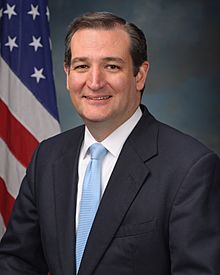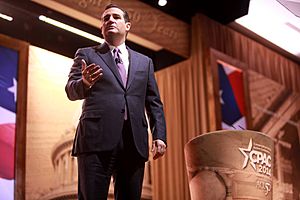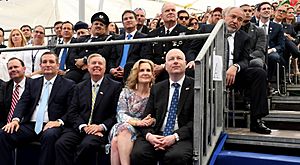Ted Cruz facts for kids
Quick facts for kids
Ted Cruz
|
|
|---|---|
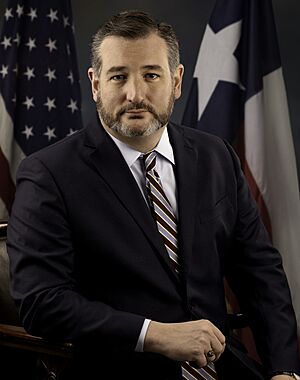
Official portrait, 2019
|
|
| Chair of the Senate Commerce Committee | |
| Assumed office January 3, 2025 |
|
| Preceded by | Maria Cantwell |
| Ranking Member of the Senate Commerce Committee | |
| In office January 3, 2023 – January 3, 2025 |
|
| Preceded by | Roger Wicker |
| Succeeded by | Maria Cantwell |
| United States Senator from Texas |
|
| Assumed office January 3, 2013 Serving with John Cornyn
|
|
| Preceded by | Kay Bailey Hutchison |
| 3rd Solicitor General of Texas | |
| In office January 9, 2003 – May 12, 2008 |
|
| Appointed by | Greg Abbott |
| Preceded by | Julie Parsley |
| Succeeded by | James C. Ho |
| Personal details | |
| Born |
Rafael Edward Cruz
December 22, 1970 Calgary, Alberta, Canada |
| Citizenship |
|
| Political party | Republican |
| Spouse | |
| Children | 2 |
| Relatives | Rafael Cruz (father) |
| Education | |
| Signature |  |
| Website | |
Rafael Edward "Ted" Cruz (born December 22, 1970) is an American politician and lawyer. He has served as a United States senator for the state of Texas since 2013. A senator is a person elected to represent their state in the U.S. Senate, which is part of Congress.
Cruz is a member of the Republican Party. Before becoming a senator, he was the solicitor general of Texas from 2003 to 2008. A solicitor general is a top lawyer who represents the state in important court cases.
In 2016, Cruz ran for President of the United States but did not win the Republican nomination. He is known for his conservative views on the economy and social issues.
Contents
Early Life and Education
Rafael Edward Cruz was born on December 22, 1970, in Calgary, Alberta, Canada. His mother, Eleanor, was born in Delaware and has Irish and Italian roots. His father, Rafael, was born in Cuba and came to the United States in 1957.
At the time Ted was born, his parents were living in Canada and working in the oil business. The family later moved to Houston, Texas. When he was 13, he started going by the name "Ted."
Cruz was a top student in high school. He then went to Princeton University, where he was a star debater. He won national awards for his speaking skills. After Princeton, he attended Harvard Law School, one of the best law schools in the country. He graduated with high honors in 1995.
Legal and Political Career Beginnings
After law school, Cruz worked for several important judges. He was a law clerk for a judge on a U.S. Court of Appeals and later for William Rehnquist, the Chief Justice of the U.S. Supreme Court.
In 1999, Cruz joined the presidential campaign of George W. Bush as a policy advisor. After Bush became president, Cruz worked in the Justice Department and at the Federal Trade Commission.
Texas Solicitor General
In 2003, Cruz was appointed as the solicitor general of Texas. In this role, he argued nine cases before the U.S. Supreme Court. This is the highest court in the country.
One famous case involved a monument of the Ten Commandments on the grounds of the Texas State Capitol. Cruz successfully argued that the monument could stay. He also argued in a case about whether students should say the words "under God" in the Pledge of Allegiance.
His work as solicitor general made him well-known among conservatives. He was named one of the best lawyers in the country by several legal magazines.
U.S. Senate Career
Cruz decided to run for the U.S. Senate in 2012. He was supported by the Tea Party, a group within the Republican Party that wanted smaller government. He won the election and became the first Hispanic American to serve as a U.S. senator from Texas.
Cruz was reelected in 2018 after a close race against Democrat Beto O'Rourke. He won a third term in 2024 against Democrat Colin Allred.
Work in the Senate
In the Senate, Cruz has focused on conservative goals. In 2013, he played a leading role in a government shutdown. He and some other Republicans tried to stop the Affordable Care Act, a major healthcare law, by refusing to approve the government's budget. He gave a 21-hour speech on the Senate floor to explain his position.
Cruz has also worked on laws related to national security. In 2014, he wrote a bill that was signed into law by President Barack Obama. The law allows the president to deny entry to the U.S. for any ambassador to the United Nations who has been involved in spying or terrorist activities.
2020 Election
After the 2020 presidential election, Cruz questioned the results in some states. He argued that there should be a special commission to review the votes before Joe Biden was officially named the winner.
On January 6, 2021, when Congress met to count the electoral votes, Cruz voted to object to the results from Arizona and Pennsylvania. The Senate rejected these objections, and Joe Biden was certified as the president.
Committee Assignments
As a senator, Cruz serves on several important committees, including:
- Committee on Commerce, Science, and Transportation
- Committee on Foreign Relations
- Committee on the Judiciary
- Committee on Rules and Administration
2016 Presidential Campaign
On March 23, 2015, Cruz announced he was running for president. He was the first major Republican candidate to enter the race. His campaign was popular with social and libertarian conservatives.
Cruz won the first contest of the primary season, the Iowa caucuses. He went on to win 11 more states, including his home state of Texas. He received over 7.8 million votes in total.
In April 2016, he announced that if he won the nomination, his vice-presidential running mate would be Carly Fiorina. However, after losing the Indiana primary in May, Cruz ended his campaign. Donald Trump went on to win the Republican nomination. At first, Cruz and Trump were rivals, but Cruz later endorsed Trump and became one of his key supporters in the Senate.
Key Political Views
Cruz is known as a strong conservative. This means he generally believes in limited government, individual freedom, and traditional values.
Economy
Cruz supports policies that he believes will help the economy grow. He has proposed a flat tax, which would mean everyone pays the same tax rate. He also wants to get rid of the IRS, the government agency that collects taxes.
He believes the government should be smaller and has said he would eliminate several government departments, including the Department of Education and the Department of Energy.
Energy and Environment
Cruz does not agree with the scientific view that human activity is the main cause of climate change. He has said that data does not show significant warming in recent years.
He is a strong supporter of the oil and gas industry, which is very important to the Texas economy. He supports projects like the Keystone XL Pipeline to transport oil.
Foreign Policy
Cruz believes in a strong American presence in the world. He is a firm supporter of Israel and has co-sponsored laws to support the country.
He is also a strong critic of the governments of China and Iran. He opposed the 2015 international nuclear deal with Iran and has called for tougher actions against the country. He has also spoken out against China's government on issues of trade and human rights.
Social Issues
Cruz holds conservative views on social issues. He believes that marriage should be defined as being between one man and one woman. He has said that this issue should be decided by each state, not by the federal government.
Personal Life
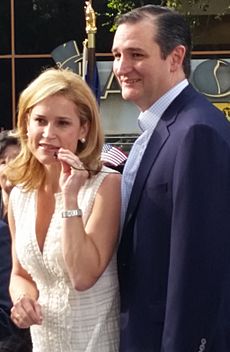
Cruz married Heidi Nelson in 2001. They have two daughters, Caroline and Catherine. His wife, Heidi, is a successful investment manager at Goldman Sachs. The family lives in Houston, Texas.
Cruz is a Southern Baptist. He often wears cowboy boots, a symbol of his Texas roots.
In 2020, Cruz started a podcast called Verdict with Ted Cruz. On the show, he discusses current events and politics.
Electoral History
| Year | Office | Type | Party | Main opponent | Party | Votes for Cruz | Result | Ref. | |||||
|---|---|---|---|---|---|---|---|---|---|---|---|---|---|
| Total | % | P. | ±% | ||||||||||
| 2012 | Senator | Primary | Republican | David Dewhurst | Republican | 480,558 | 34.16% | 2nd | N/A | Won | |||
| Runoff | 631,812 | 56.82% | 1st | N/A | Won | ||||||||
| General | Paul Sadler | Democratic | 4,440,137 | 56.46% | 1st | -5.23% | Won | ||||||
| 2016 | President | Primary | Republican | Donald Trump | Republican | 7,822,100 | 25.08% | 2nd | N/A | Lost | |||
| Convention | 551 | 22.3% | 2nd | N/A | |||||||||
| 2018 | Senator | Primary | Republican | Mary Miller | Republican | 1,322,724 | 85.36% | 1st | +51.2% | Won | |||
| General | Beto O'Rourke | Democratic | 4,260,553 | 50.89% | 1st | -5.57% | Won | ||||||
| 2024 | Senator | Primary | Republican | Holland Gibson | Republican | 1,977,961 | 88.30% | 1st | +2.94% | Won | |||
| General | Colin Allred | Democratic | 5,990,741 | 53.07% | 1st | +2.18% | Won | ||||||
See Also
 In Spanish: Ted Cruz para niños
In Spanish: Ted Cruz para niños
- List of foreign-born United States politicians
- List of Hispanic and Latino Americans in the United States Congress
- List of United States senators born outside the United States
 | William M. Jackson |
 | Juan E. Gilbert |
 | Neil deGrasse Tyson |


